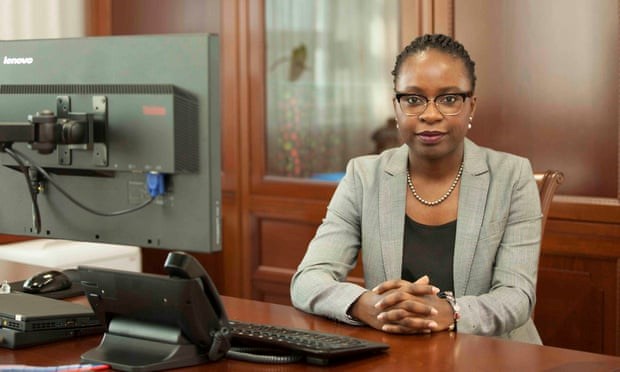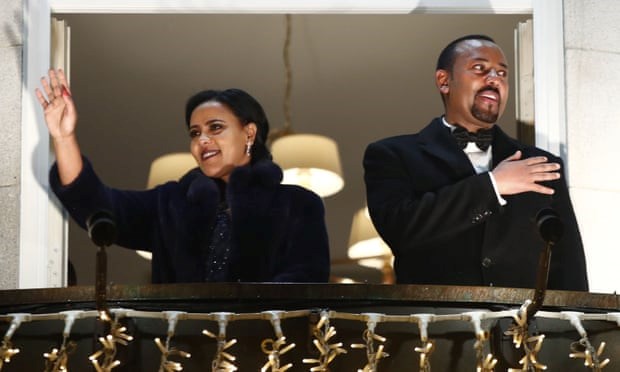
Jason Burke Africa correspondent
Tuesday December 31, 2019

Vera Daves de Sousa, 34, is finance minister in Angola, where politics was previously dominated by elderly men, many of them veterans of the long civil war. Photograph: Courtesy of Angola Ministry of Finance
After several years during which younger leaders have come to power across Africa, 2020 could hold challenges that may force many of the newcomers to take a step back.
Not all the young politicians are progressive, or even pro-democracy. But they are all representative of sweeping changes across the continent that have destabilised long-standing regimes and forced out some veteran leaders.
They include a 34-year-old female finance minister of one of Africa’s biggest states, a 37-year-old dissident rapper and opposition leader and a dynamic 43-year-old Nobel-prize-winning prime minister.
Two “dinosaurs” who were forced out of politics in 2019 – Abdelaziz Bouteflika, the 82-year-old president of Algeria, who had ruled since 1999, and Omar al-Bashir, 75, in power in Sudan since 1989 – fell victim to mass movements spearheaded by young protesters, though in each case the once-powerful rulers were left vulnerable when armed forces withdrew their support.
The huge numbers of young people reaching adulthood across Africa have fuelled a powerful desire for change and has pushed forward a new wave of younger political figures who could dramatically influence the continent’s future.
One of the most striking recent appointments was in Angola, where its president, João Lourenço, appointed Vera Daves de Sousa, a 34-year-old former researcher and analyst, to be the new finance minister. The political system in the former Portuguese colony has long been dominated by elderly men, especially senior soldiers who fought in the decades-long civil war.
Alex Vines, director of the Africa programme at London’s Chatham House, said Lourenço’s appointment of a swath of younger people, including many women, to senior positions within the government was a gamble.
“He has leapfrogged a generation to appoint more technocratic, able people, including many women, to key posts. He sees them as change agents … Next year will be the litmus test for the reform process,” Vines said.

Abiy Ahmed and his wife Zinash Tayachew wave from the balcony of the Grand Hotel in Oslo on 10 December during a torch parade in honour of his Nobel peace prize. Photograph: Terje Pedersen/NTB Scanpix/AFP via Getty Images
Perhaps the most high-profile of the young leaders is Abiy Ahmed, the 43-year-old prime minister of Ethiopia and winner of 2019’s Nobel peace prize.
Since coming to power in 2018, Abiy has ended a nearly 20-year military stalemate with Eritrea, and pushed through reforms at home, dramatically changing the atmosphere in what was regarded as a repressive state.
But he faces upcoming elections amid political infighting and rising ethnic tensions, which have led some analysts to fear that “the state could crumble”.
Nick Cheeseman, professor of democracy at the University of Birmingham and an expert in African politics, said Abiy was facing a hard choice between a shift towards authoritarianism, or the difficult task of generating confidence and belief in his reforms.
“What happens in Ethiopia has massive implications for the countries around it,” Cheeseman said.
In Sudan, the protest movement that swept away Bashir has opened the way to younger political figures. But some may not be any more progressive or less predatory than the former ruler.
One is Mohamed Hamdan Dagalo, a 43-year-old warlord accused of systematic human rights abuses, who has emerged as perhaps the most powerful man in the country. He is now deputy chairman of the sovereign council that still holds supreme power.
Elsewhere some young leaders who have challenged entrenched interests have stumbled. In South Africa, Mmusi Maimane, a 39-year-old once breathlessly hailed as the Obama of Soweto, resigned as leader of the opposition Democratic Alliance following disappointing election results.
Julius Malema, the 38-year-old leader of the populist, radical leftwing Economic Freedom Fighters, also failed to make any breakthrough in the polls in South Africa and senior party members have been hit by corruption charges, which they deny.
In Uganda, Bobi Wine, an opposition MP and popular music star, has generated international attention but is yet to build the kind of political machine that would challenge the country’s veteran leader, Yoweri Museveni, while in Zimbabwe, Nelson Chamisa, a 41-year-old former pastor who has led the Movement for Democratic Change since 2018, has struggled to mobilise sufficient numbers to destabilise the ruling Zanu-PF government under 78-year-old Emmerson Mnangagwa.
“They have inherited, or are opposing, deep-seated neo-patrimonial systems. You can destabilise them, you can even bring down a leader, but the transitional politics are very, very difficult and sometimes they just don’t work out,” said Vines. The situation was highlighted in Algeria, where disputed presidential election results handed victory to Abdelmadjid Tebboune, a 74-year-old former prime minister and Bouteflika loyalist.
The young rulers and challengers remain a minority. The average age of African leaders is more than 60, which means that the continent with the youngest citizens has the oldest rulers.
“We have seen some younger leaders but there are still a lot of very old ones too,” Cheeseman said.